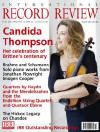Texte paru dans: / Appeared in:
*

International Record Review - (03/2013)
Pour
s'abonner / Subscription information
Harmonia Mundi
HMC902143

3149020214329 (ID285)
Consultez toutes les évaluations recensées pour ce cd
~~~~ Reach all the evaluations located for this CD
Harpsichordist and fortepianist Andreas Staier has contributed greatly to a contemporary understanding of how Baroque and Classical repertory can sound on period instruments, and although the concept of good taste is perhaps as slippery as it is ephemeral, Staier surely comes close to an ideal synthesis of historical awareness and charisma. His 2011 disc of C. P. E. Bach concertos was awarded the esteemed Preis der Deutschen Schallplattenkritik (reviewed in May 2011), while his other recordings for a variety of labels, including DG, Sony and Teldec, complement a growing oeuvre for Harmonia Mundi, which contains a veritable treasure chest of music by J. S. Bach, Mozart, Beethoven and others. A personal favourite is Staier’s recording of Haydn concertos with the Freiburger Barockorchester (reviewed in February 2005), in which the ensemble’s combined grasp of the stylistic possibilities is simply stunning.
The presentation of this latest release, featuring short pieces by Froberger, D’Anglebert , Fischer, Couperin , Clérarnbault and Muffat, enigmatically entitled ‘ . . . pour passer la mélancolie’, is superb, both from a visual and audio perspective. It makes such a difference to have plenty of contextual imagery to pore over as you enjoy the charismatic timbre of the anonymous instrument featured on the album (the initials ‘NFD’ are all that remained etched on an instrument that required some 2,500 hours of skilled renovation to bring back from the brink) . This could be described as a concept CD in that the music contained within it is thought to chime with the potently symbolic paintings which so frequently depict melancholy during the Baroque period, and indeed Staier explains in his Foreword how he is able to read much of this into the fabric of the music itself — the allusion to a moment frozen in time revealed in a briefly reticent rhythm perhaps — and furthermore proposes that ‘the ostinato conception of the frequent chaconnes and passacaglias may readily be understood as a symbol of ineluctable fatality’.
I nodded knowingly upon reading Melanie Wald-Fuhrmann’s notes, in which she writes (in relation to the weather likely encountered during Jakob Froberger’s visit to England) that ‘the British Isles were regarded as a particularly favourable breeding ground for melancholy, which since the sixteenth century had also been known as the English malady’. Plus ça change . . . Froberger, whose Suite XXX in A minor and ‘Libro quarto’ from Suite VI begin and end the programme respectively, perhaps best epitomizes the newly emancipated French/ Italian flavour of lute and harpsichord music from around the middle of the seventeenth century, and the ‘plaincte faite à Londres pour passer la Melancolie la quelle se joüe lentement et à discretion’ is nothing short of mystical in its interplay of emotions.
I particularly like the Clérambault Suite in C minor of 1 704, with its fantastically jaunty ‘ Gigue ‘ captured so irresistibly by Staier - the perfect foil to the ‘Sarabande Grave’ that precedes it, or the ‘ Courante ‘, which skips along delightfully — all the more so, given the impossibly nimble ornamentation and inventiveness which so characterizes Staier throughout the recording. To hear the instrument in all its resonant glory I wouldn’t hesitate to nudge you in the direction of the Couperin ‘Chaconne’ (from the Suite in F major), in which an occasional unannounced virtuosic flourish will likely wipe away any tears that may have begun to well up. This, in fact, is one of the reasons the disc works so wholesomely for a feeling of melancholy can just as effectively be deflected by this music as indulged by it, and not by any means are ail of the pieces herein dolefuily paced or cast in a minor key. You needn’t, therefore, set aside this disc for consoling post-Valentine’s Day regrets or assuaging the lingering pain of your tax bill, as much of the music celebrates life so vibrantly.
Cliquez l'un ou l'autre
bouton pour découvrir bien d'autres critiques de CD
Click either button for many other reviews


